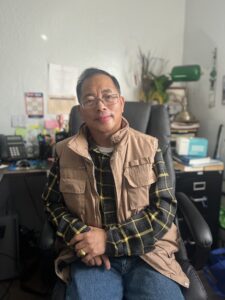by Yucheng Tang
posted Jan. 21
Among more than a thousand reports received by the California vs Hate hotline in the first year, the most commonly cited form of hate was based on race and ethnicity.

Anti-Black bias was the most common, followed by anti-Latino and anti-Asian, said Kevin Kish, director of the California Civil Rights Department, during a Jan. 17 briefing organized by Ethnic Media Services (EMS).
The Civil Rights Department launched the hotline in May 2023, and connects victims and witnesses of hate incidents and hate crimes with the resources they may need, including legal services, counseling, mental health services and financial assistance. People can report online in 15 languages, including English, Spanish, Hmong, Filipino and Chinese, or by phone in 200 languages.
In its first year, the hotline received contacts from nearly 80% of California’s counties, Kish said.
Seng Yang, the director of the Hmong Cultural Center in Oroville, in an interview with ChicoSol discussed a couple of incidents that his clients encountered last year that he believes were related to their ethnicity.
In one case, a woman told Yang that some people tried to destroy pots of herbs surrounding her house and threatened her with violence. The woman is in her 70s, barely speaks English and was saddened by the confrontation, Yang said.
Another Hmong elder was attacked and bitten by a dog in Oroville’s Southside while the homeowner failed to intervene, he said.

“It’s incredibly important to have services created like the California vs Hate hotline that helps spotlight and make mainstream our community’s issues,” said Gaonou Vang, who spoke at the EMS briefing and is communications and narrative manager at Hmong Innovating Politics.
However, Vang noted that it requires foundational and intimate trust in order for the hotline to succeed and minimize under-reporting, especially when Hmong and Southeast Asian American people are tightly wound within their community systems, such as the Hmong 18-clan system. (Hmong-Americans are organized into an 18-clan structure; all members of a clan recognize that they are related by a common ancestor.)
Kish said there are various reasons for the under-reporting of hate incidents, including lack of confidence in the government due to previous disappointing experiences, lack of legal knowledge, language barriers, fear of contacting law enforcement among immigrants, and jurisdictional issues between tribal, local, state and federal authorities for indigenous communities.
The purpose of launching this hotline is to overcome all those barriers, Kish said.
“It’s designed to help everyone who experiences hate, no matter who they are, no matter where they are in our state, and no matter whether what they experienced was in fact a crime,” Kish said. “You can report anonymously if that’s what you choose to do. You don’t have to disclose immigration status.”
“What you get out of the hotline is driven by what you want, what you identify as needing,” Kish added.
At the Hmong Cultural Center in Oroville, Yang noted that the elderly face especially tough circumstances. He said some of the Hmong elders suffer from mental health issues including depression. They often cannot speak English, have no social life and feel isolated, some of them having nightmares about the war they went through when they were young and the journey of escape from their hometowns.
The Center organizes in-person meetings for the elderly three times every month and conducts home visits to senior clients. “We’ve been here to share, to talk about social life, and also help them, educate them about the kind of resources that might be provided for them,” Yang said.
At the EMS briefing, Vang said that some Hmong in California worry about being deported, which might discourage them from reporting hate incidents to the government.
Kish said rural counties are among those that haven’t produced calls to the hotline. He said the lack of reporting from rural California is reflected in the Attorney General’s hate crime report. “Many of these (rural) counties are reporting zero or very few hate crimes,” he noted.
(A hate crime — not just a hate incident — refers to a criminal offense driven by a bias against a race, religion, disability, sexual orientation, ethnicity, gender, or gender identity.)
According to the Attorney General’s 2023 hate crime report, Butte County reported 19 hate crime offenses and Shasta County reported 15 offenses, while rural Glenn County west of Butte reported zero hate crimes.
Report a hate incident or hate crime by phone at 833-866-4283. Report online here.
Yucheng Tang is a California Local News Fellow reporting for ChicoSol.
